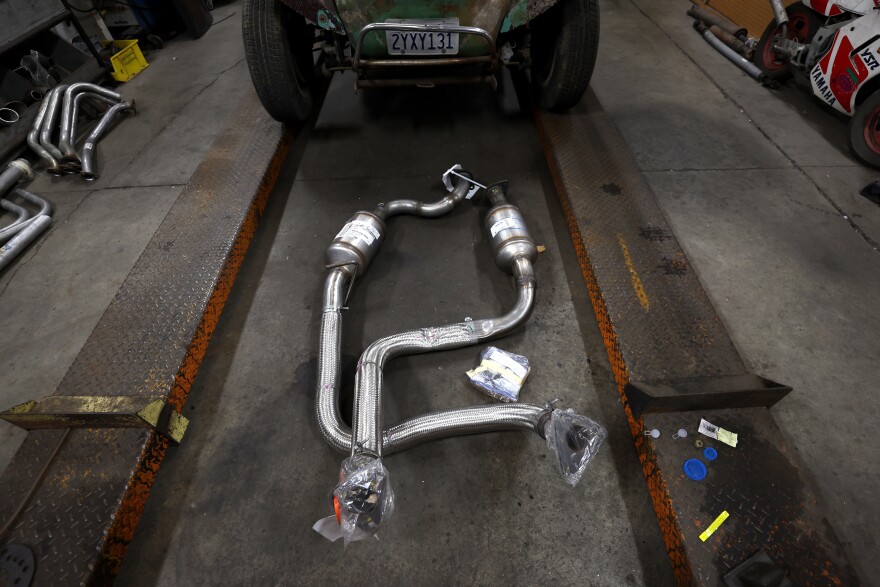Updated October 19, 2023 at 4:27 PM ET
How can car owners protect themselves from the wave of catalytic converter theft that has swept the country?
Claims for stolen catalytic converters doubled in the year ending June 2022, according to State Farm, the largest auto insurer in the U.S., whose customers reported more than 43,200 stolen converters that year.
In 2022, over 64,000 converters were stolen across the country, a 288% increase from 2020, according to the National Insurance Crime Bureau, an industry group that tracks insurance-related crimes.
On Monday, the Department of Justice announced a mother and her two sons pleaded guilty that they made $38 million in connection with a nationwide crime ring accused of trafficking stolen catalytic converters.
Catalytic converters – which helps a car clean its exhaust – have become a target for theft in large part because of the price of precious metals, like palladium and platinum, that are used in the parts.
And, crucially, their location on the exterior of a car's underside makes them easy to steal, David Glawe of the NCIB told NPR in 2022.
Stealing a converter takes just a few minutes and a battery-operated saw. "You slide under the car, slice through your exhaust system, and you're in and out usually within 30 seconds to a minute," Glawe said.
Especially at risk are cars with enough tire clearance for a thief to easily slide underneath, like SUVs and pickup trucks. Hybrids are also attractive targets because their converters contain even more precious metals.
Replacing a stolen converter can cost thousands. Here are some precautions you can take:
How can I protect my car from catalytic converter theft?
Insurance companies, mechanics and police departments have recommended a wide range of anti-theft measures designed to deter a would-be thief. "It's a holistic approach," said Glawe.
The simplest solution is to keep your car away from public access when you're not using it. If you have access to a garage, keep your car there. Those without a garage should try to park their car in a well-lit area, or somewhere you can install a security camera.
But even a garage might not be enough to protect your car. Public parking spots of all kinds have become a target for daytime theft, the Institute of Scrap Recycling Industries, a recycling industry trade group, has warned.
"[At] hospitals, it's happening because people go to the hospital and either park and visit, or they're in the hospital for a long period of time, and their car sits there," said Todd Foreman, the group's director of law enforcement outreach. "It's happening to big trucks, to churches."
Some cities have hosted workshops in which car owners can get their vehicle identification numbers engraved on their catalytic converter for free – an indication to would-be buyers that the converter has been stolen.
Foreman also recommends painting your converter with brightly colored, high-temperature paint, which can put off a thief who'd have to scrape it all off before selling. "If they climb under a car and see it's spray-painted," he said, "they know they're more likely to be caught stealing those catalytic converters."
Other solutions might cost a bit of money: Owners can attach alarm systems that are triggered by the vibration of a thief's saw. Other, more expensive anti-theft devices are designed to make a converter make more cumbersome to remove. Mechanics can also weld on metal plates or rebar to shield the converter.
What should I do if it's been stolen?
If your converter has been stolen, you're likely to notice right away: Without the converter, your car will be much noisier than usual.
Most cars will run without a catalytic converter, though it's inadvisable to do so for longer than necessary. Because the purpose of a catalytic converter is to reduce harmful emissions, cars without one will pollute much more heavily than an intact car, and you could fail an emissions inspection in states that require them.
When thieves use a saw to remove a catalytic converter, they can also cause damage to nearby parts of your car, like the alternator or fuel lines. It's best to get your car checked out by a mechanic as soon as possible.
And check your car insurance. Comprehensive coverage on an auto insurance policy will cover damage to your car that occurs outside of a collision – including theft.
Copyright 2023 NPR. To see more, visit https://www.npr.org.



